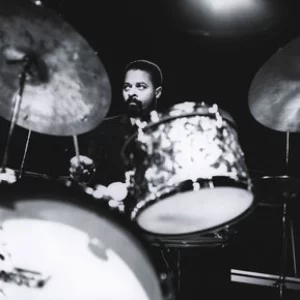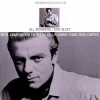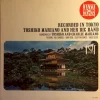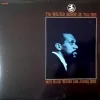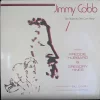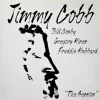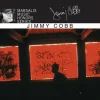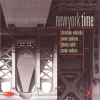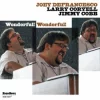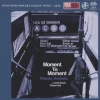Biography Jimmy Cobb
Jimmy Wilbur Cobb (born January 20, 1929, in Washington, D.C.) is an American jazz drummer.
Probably his most famous work is on Miles Davis' Kind of Blue (1959), considered by many to be the quintessential jazz record. Cobb is the last surviving player from the session. He also played on other famous Davis albums, including Sketches of Spain, Someday My Prince Will Come, Miles Davis at Carnegie Hall, In Person Friday and Saturday Nights at the Blackhawk, Complete, and briefly on Porgy and Bess and Sorcerer.
Jimmy Cobb has worked extensively with a wide range of artists, including Dinah Washington, Pearl Bailey, Clark Terry, Cannonball Adderley, Dizzy Gillespie, John Coltrane, Sarah Vaughan, Billie Holiday, Wynton Kelly, Stan Getz, Wes Montgomery, Gil Evans, Miles Davis, Paul Chambers, Kenny Burrell, J. J. Johnson, Sonny Stitt, Nat Adderley, Hank Jones, Ron Carter, George Coleman, Fathead Newman, Geri Allen, Earl Bostic, Leo Parker, Charlie Rouse, Ernie Royal, Philly Joe Jones, Bobby Timmons, Walter Booker, Jerome Richardson, Keter Betts, Jimmy Cleveland, Sam Jones, Red Garland, Joe Henderson, Eddie Gomez, Bill Evans, Stefan Karlsson, Jeremy Steig, Richard Wyands, Peter Bernstein, Richie Cole, Nancy Wilson, Ricky Ford, David Amram, and many more.
As of 2011, Cobb leads the Jimmy Cobb "So What" Band, a tribute to 50 years of Kind of Blue and the music of Miles Davis.
In June 2008, Jimmy Cobb was the recipient of the Don Redman Heritage award. On October 17, 2008, Cobb was one of six artists to receive the 2009 National Endowment for the Arts NEA Jazz Masters award.
Discography
As leader
Marsalis Music Honors Series: Jimmy Cobb (Marsalis/Rounder, 2006)
As sideman
With the Pepper Adams Donald Byrd Quintet
Out of this World (Warwick, 1961)
With Cannonball Adderley
Sophisticated Swing (EmArcy, 1956)
Cannonball Enroute (EmArcy, 1957)
Cannonball's Sharpshooters (EmArcy, 1958)
Jump for Joy (EmArcy, 1958)
Cannonball Adderley Quintet in Chicago (Mercury, 1959)
Cannonball Takes Charge (Riverside, 1959)
With Nat Adderley
That's Right! (Riverside, 1960)
With Toshiko Akiyoshi
Toshiko Mariano and her Big Band (Vee-Jay, 1964)
With Lorez Alexandria
Alexandria the Great (Impulse!, 1964)
More of the Great Lorez Alexandria (Impulse!, 1964)
With Dorothy Ashby
Soft Winds (Jazzland, 1961)
With Walter Benton
Out of This World (Jazzland, 1960)
With John Coltrane
Standard Coltrane (Prestige, 1958)
Stardust (Prestige, 1958)
Kenny Burrell and John Coltrane (Prestige, 1958)
Bahia (Prestige, 1958)
Giant Steps on "Naima" only (Atlantic, 1959)
Coltrane Jazz (Atlantic, 1959)
With Miles Davis
Porgy and Bess (Columbia, 1958)
1958 Miles (Columbia, 1958)
Jazz at the Plaza (Columbia, 1958)
Kind of Blue (Columbia, 1959)
Sketches of Spain (Columbia, 1960)
Someday My Prince Will Come (Columbia, 1961)
In Person Friday and Saturday Nights at the Blackhawk, Complete (Columbia, 1961)
Miles & Monk at Newport (Columbia, 1963)
With Kenny Dorham
Blue Spring (Riverside, 1959)
With Kenny Drew
Lite Flite (SteepleChase, 1977)
With Curtis Fuller
Soul Trombone (Impulse!, 1961)
With Benny Golson
Pop + Jazz = Swing (Audio Fidelity, 1961) - also released as Just Jazz!
Turning Point (Mercury, 1962)
With Paul Gonsalves
Gettin' Together (Jazzland, 1960)
With Joe Henderson
Four (Verve, 1968)
Straight, No Chaser (Verve, 1968)
With John Hendricks
Freddie Freeloader (Denon, 1990)
With Wynton Kelly
Kelly Blue (Riverside, 1959)
Wynton Kelly! (Vee-Jay, 1961)
Someday My Prince Will Come (Vee-Jay, 1961)
Comin' in the Back Door (Verve, 1963)
It's All Right! (Verve, 1964)
Undiluted (Verve, 1965)
Blues on Purpose (Xanadu, 1965)
Full View (Riverside, 1967)
Last Trio Session (Delmark, 1968)
With Hubert Laws
The Laws of Jazz (Atlantic, 1964)
With Johnny Lytle
New and Groovy (Tuba, 1966)
With Pat Martino
Desperado (Prestige, 1970)
With Wes Montgomery
Full House (Riverside, 1962)
Boss Guitar (Riverside, 1963)
Guitar on the Go (Riverside, 1963)
The Alternative Wes Montgomery (Riverside, 1963)
Smokin' at the Half Note (Verve, 1965)
Smokin' Guitar (Verve, 1965)
Willow Weep for Me (Verve, 1969)
With Art Pepper
Gettin' Together (Contemporary, 1960)
With Sonny Red
Out of the Blue (Blue Note, 1960)
The Mode (Jazzland (1961)
Images (Jazzland, 1961)
With Shirley Scott
For Members Only (Impulse!, 1963)
On a Clear Day (Impulse!, 1966)
With Wayne Shorter
Introducing Wayne Shorter (Vee-Jay, 1959)
With Teri Thornton
Devil May Care (Riverside, 1961)
With Bobby Timmons
This Here is Bobby Timmons (Riveside, 1960)
Easy Does It (Riverside, 1961)
From the Bottom (Riverside, 1964)
The Soul Man! (Prestige, 1966)
Got to Get It! (Milestone, 1967)
With Norris Turney
Big, Sweet 'n Blue - with Larry Willis and Walter Booker (Mapleshade Records, 1993)
With Sarah Vaughan
Live in Japan (Mainstream, 1975)
Ronnie Scott's Presents Sarah Vaughan Live (Pye, 1977)
In a career spanning nearly six decades, drummer Jimmy Cobb has proven to be a master of every musical situation. One of jazz’s definitive accompanists, Cobb made his name in support of such giants as Dinah Washington, Cannonball Adderley, Miles Davis, Wes Montgomery and Sarah Vaughan, and on literally hundreds of studio sessions. As the drummer on Davis’ legendary album Kind of Blue, Cobb may be the most frequently heard (if not the best known) drummer in jazz history; and as part of the legendary Davis rhythm section with pianist Wynton Kelly and bassist Paul Chambers, he created a manner of swinging in the modern idiom that remains the gold standard for rhythmic inspiration. For all his achievements, however, Jimmy Cobb’s contribution has too often been taken for granted, which is why he is the perfect subject to help launch the new Honors Series from Marsalis Music.
“There was a lot of music coming through Washington, D.C. when I was growing up,” Cobb notes in explaining the development of his style, “and as a working musician you had to play in a whole lot of situations. By working clubs, dances, concerts and the shows that were featured in movie theaters, your growth was shaped. The way I play the cymbal, for instance, is something I heard from a guy who came through Washington. It’s not exactly how he played it, of course; it’s how I heard it.”
What Cobb heard – a lean, assertive beat that drives a band without calling attention to itself – shaped some of the most influential music of the ‘50s and ‘60s. His stints with Cannonball Adderley (1956-7), Miles Davis (1958-63) and the cooperative trio with Wynton Kelly and Paul Chambers that worked both on its own and in support of Wes Montgomery (1963-8), as well as countless recordings by a who’s-who of jazz greats, confirmed his mastery in the small-group format.
Creative Commons By-SA License
 FM
FM
